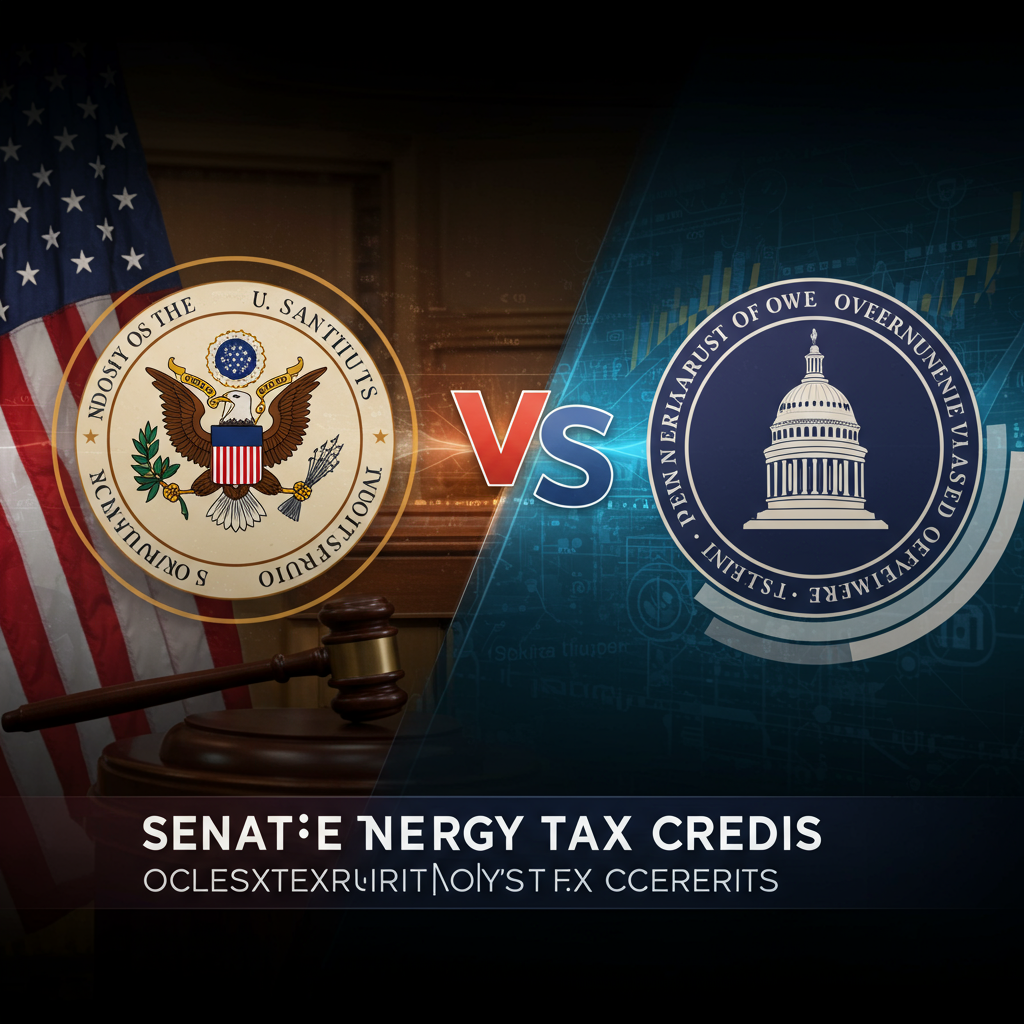A House Republican plan to significantly cut clean energy tax credits faces strong resistance in the Senate, potentially jeopardizing billions in planned investments and sparking concerns about jobs and economic uncertainty.
At issue are key clean energy incentives originally enacted under the 2022 Inflation Reduction Act (IRA). The version of a major legislative package passed by the House earlier this year proposes largely eliminating these credits, which analysts warn could halt an estimated $522 billion in approved investments across the country.
The House bill targets incentives vital for renewable energy projects, proposing to roll back credits for wind, solar, and hydrogen power. It would also phase out consumer tax credits for new electric vehicles and terminate credits for projects beginning construction more than 60 days after the bill becomes law, among other changes.
Resistance Builds in the Senate
While the bill progresses through Congress as part of a larger GOP legislative package moving via budget reconciliation, a number of Republican senators are voicing caution against a wholesale repeal. Senators Lisa Murkowski of Alaska, John Curtis of Utah, Thom Tillis of North Carolina, and Jerry Moran of Kansas cautioned Senate leadership against a “full-scale repeal of current credits” in an April letter.
They argued that numerous American companies have made substantial investments in domestic energy production and infrastructure based on the existing tax framework. A sudden repeal, they stated, would “create uncertainty, jeopardizing capital allocation, long-term project planning, and job creation in the energy sector and across our broader economy.”
Speaking to NPR, Senator Curtis emphasized the need for senators to evaluate these credits based on the country’s best interests and sound tax policy, rather than simply opposing them because they were part of the IRA. He stressed that “inconsistency and unpredictability” are harmful to businesses and advocated for thoughtful “appropriate off-ramps” or phase-outs if credits are to be eliminated, ensuring consideration for employees, businesses, and lenders to maintain business certainty.
Industry Concerns and Economic Impacts
Energy industry leaders and advocates are actively lobbying senators, warning that without modifications to the House plan, Americans could face higher energy bills and fewer jobs. Political action committees like Protect Our Jobs are funding ads targeting House Republicans who supported the repeal, highlighting the potential negative impact on clean energy employment.
Outside business groups are echoing these concerns with concrete data. E2, a nonpartisan business group focused on the environment, has tracked clean energy investments and reports that market uncertainty began impacting projects even before the House bill passed. According to E2’s executive director, Bob Keefe, approximately $14 billion in business investment for new factories and clean energy projects—including EV plants, solar, wind, and battery facilities—has been canceled since January alone due to uncertainty surrounding the bill. E2 estimates this has led to the cancellation of over 10,000 announced jobs. Keefe noted that many significant clean energy projects are located in Republican-leaning states and warned that the economy would suffer if the Senate doesn’t address the bill’s provisions.
Even Some House Republicans Seek Changes
The pressure isn’t only coming from outside groups and the Senate. Some House Republicans who voted for the bill are now urging the Senate to make adjustments. Pennsylvania Representative Rob Bresnahan is among 13 House GOP members who sent a letter to Senate leadership, requesting “substantial and strategic improvement” to the clean energy tax credit provisions.
While some accept a eventual phase-out, they are concerned about the abruptness of the House bill’s changes, particularly the restrictive 60-day timeline for project enactment and limitations on credit transferability. They argue this approach lacks the necessary “runway” for projects already committed, potentially jeopardizing ongoing development and discouraging long-term investment.
Part of a Broader, Contentious Package
The clean energy tax credit repeal is just one component of the larger Republican legislative effort, often dubbed the “One Big Beautiful Bill Act.” Moving through Congress via reconciliation, the bill aims to enact a range of policy priorities but faces significant internal GOP opposition in the Senate, adding to the pressure for changes.
Concerns about the bill’s impact on the national debt are prominent. Analysis from the nonpartisan Congressional Budget Office (CBO) estimates the overall bill would add trillions to federal deficits over the next decade (one CBO analysis projected $2.4 trillion, another $3.8 trillion over 10 years from tax provisions alone), fueling opposition from fiscal conservatives and “spending hawks” like Senators Ron Johnson and Rand Paul.
Adding significant outside pressure is tech billionaire Elon Musk, who has launched a public campaign using social media to call the bill a “disgusting abomination” and urging followers to “KILL the BILL.” Musk’s opposition stems partly from the deficit concerns but also specifically targets the bill’s proposed termination of clean energy and electric vehicle credits, which he argues threatens America’s energy independence.
Other controversial provisions within the bill, such as significant changes and cuts to Medicaid that a CBO analysis estimates could strip health coverage from nearly 11 million Americans, also contribute to the bill’s difficult path and the need for Senate modification. Senators Josh Hawley and Jim Justice, among others, have raised concerns about specific Medicaid provisions.
The Path Forward Remains Challenging
Senate Majority Leader John Thune has acknowledged that significant modifications to the House-passed bill are “unavoidable.” However, any substantial changes approved by the Senate would require another vote in the House. This presents a major hurdle, given the House’s narrow Republican majority and strong opposition to watering down the IRA rollbacks from groups like the far-right House Freedom Caucus. House Speaker Mike Johnson has already warned senators against making major changes.
Ultimately, the fate of key clean energy tax credits hinges on a complex legislative battle. The outcome will have significant implications for future energy investments, job creation, and business certainty across the United States.




